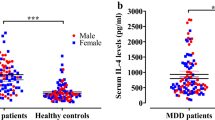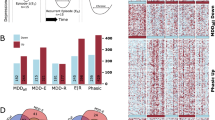Abstract
Proinflammatory cytokines, including interleukin (IL)-1beta, are suggested to have a role in the pathogenesis of major depressive disorder (MDD) and be related to the therapeutic effects of antidepressants. To elucidate a genetic predisposition of MDD, we studied biallelic polymorphism in the promoter region (position -511) of the IL-1beta gene in 157 patients with MDD and in 112 controls. We also examined the association of this polymorphism and fluoxetine therapeutic response in 119 MDD patients who received a 4-week fluoxetine treatment. No significant difference was found in the genetic polymorphism between MDD patients and controls. However, MDD patients who were homozygous for the -511T allele of the IL-1beta gene had a trend of less severity of depressive symptoms and more favorable fluoxetine therapeutic response than -511C carriers. Further study with a larger sample is needed to clarify the role of the IL-1beta genetic polymorphisms in the symptoms and treatment effects in MDD.
Similar content being viewed by others
Log in or create a free account to read this content
Gain free access to this article, as well as selected content from this journal and more on nature.com
or
References
Anisman H, Ravindran AV, Griffiths J, Merali Z (1999). Endocrine and cytokine correlates of major depression and dysthymia with typical or atypical features. Mol Psychiatry 4: 182–188.
Brambilla F, Maggioni M (1998). Blood levels of cytokines in elderly patients with major depressive disorder. Acta Psychiatr 97: 309–313.
Capuron L, Ravaud A, Dantzer R (2000). Early depressive symptoms in cancer patients receiving interleukin 2 and/or interferon alfa-2b therapy. J Clin Oncol 18: 2143–2151.
Castanon N, Bluthe RM, Dantzer R (2001). Chronic treatment with the atypical antidepressant tianeptine attenuates sickness behavior induced by peripheral but not central lipopolysaccharide and interleukin-1beta in the rat. Psychopharmacologia 154: 50–60.
Connor TJ, Leonard BE (1998). Depression, stress and immunological activation: the role of cytokines in depressive disorders. Life Sci 62: 583–606.
Dantzer R, Wollman E, Vitkovic L, Yirmiya R (1999). Cytokines and depression: fortuitous or causative association? Mol Psychiatry 4: 328–332.
Elsehety A, Bertorini TE (1997). Neurologic and neuropsychiatric complications of Crohn's disease. South Med J 90: 606–610.
Hamilton M (1967). Development of a rating scale for primary depressive illness. Br J Soc Clin Psychol 6: 278–296.
Kagaya A, Kugaya A, Takebayashi M, Fukue-Saeki M, Saeki T, Yamawaki S (2001). Plasma concentrations of interleukin-1beta, interleukin-6, soluble interleukin-2 receptor and tumor necrosis factor alpha of depressed patients in Japan. Neuropsychobiology 43: 59–62.
Lanquillon S, Krieg JC, Bening-Abu-Shach U, Vedder H (2000). Cytokine production and treatment response in major depressive disorder. Neuropsychopharmacology 22: 370–379.
Levine J, Barak Y, Chengappa KN, Rapoport A, Rebey M, Barak V (1999). Cerebrospinal cytokine levels in patients with acute depression. Neuropsychobiology 40: 171–176.
Licinio J, Wong ML (1999). The role of inflammatory mediators in the biology of major depression: central nervous system cytokines modulate the biological substrate of depressive symptoms, regulate stress-responsive systems, and contribute to neurotoxicity and neuroprotection. Mol Psychiatry 4: 317–327.
Maes M, Meltzer HY, Bosmans E, Bergmans R, Vandoolaeghe E, Ranjan R (1995). Increased plasma concentrations of interleukin-6, soluble interleukin-6, soluble interleukin-2 and transferrin receptor in major depression. J Affect Disord 34: 301–309.
Maes M, Scharpe S, Meltzer HY, Bosmans E, Suy E, Calabrese J (1993). Relationships between interleukin-6 activity, acute phase proteins, and function of the hypothalamic–pituitary–adrenal axis in severe depression. Psychiatry Res 49: 11–27.
Maier SF, Watkins LR (1995). Intracerebroventricular interleukin-1 receptor antagonist blocks the enhancement of fear conditioning and interference with escape produced by inescapable shock. Brain Res 695: 279–282.
Mansfield JC, Holden H, Tarlow JK, Di Giovine FS, McDowell TL, Wilson AG (1994). Novel genetic association between ulcerative colitis and the anti-inflammatory cytokine interleukin-1 receptor antagonist. Gastroenterology 106: 637–642.
Muller N, Ackenheil M (1998). Psychoneuroimmunology and the cytokine action in the CNS: implications for psychiatric disorders. Prog Neuropsychopharmacol Biol Psychiatry 22: 1–33.
Nelson KP, Marks NL, Heyen JR, Johnson RW (1999). Behavior of adult and aged mice before and after central injection of interleukin-1beta. Physiol Behav 66: 673–679.
Owen BM, Eccleston D, Ferrier IN, Young AH (2001). Raised levels of plasma interleukin-1beta in major and postviral depression. Acta Psychiatr Scand 103: 226–228.
Pociot F, Molvig J, Wogensen L, Worsaae H, Nerup J (1992). A TaqI polymorphism in the human interleukin-1 beta (IL-1 beta) gene correlates with IL-1 beta secretion in vitro. Eur J Clin Invest 22: 396–402.
Rothermundt M, Arolt V, Peters M, Gutbrodt H, Fenker J, Kersting A (2001). Inflammatory markers in major depression and melancholia. J Affect Disord 63: 93–102.
Utset TO, Golden M, Siberry G, Kiri N, Crum RM, Petri M (1994). Depressive symptoms in patients with systemic lupus erythematosus: association with central nervous system lupus and Sjogren's syndrome. J Rheumatol 21: 2039–2045.
Weizman R, Laor N, Podliszewski E, Notti I, Djaldetti M, Bessler H (1994). Cytokine production in major depressed patients before and after clomipramine treatment. Biol Psychiatry 35: 42–47.
Winokur G (1997). All roads lead to depression: clinically homogeneous, etiologically heterogeneous. J Affect Disord 45: 97–108.
Yu YWY, Tsai SJ, Chen TJ, Lin CH, Hong CJ (2002). Association study of the serotonin transporter promoter polymorphism and symptomatology and antidepressant response in major depressive disorders. Mol Psychiatry 7: 1115–1119.
Acknowledgements
This work was supported by grant NSC 90-2314-B-075-068 from the National Science Council, Taiwan, ROC, and grant VGH89-328 from Veterans General Hospital-Taipei.
Author information
Authors and Affiliations
Corresponding author
Rights and permissions
About this article
Cite this article
Yu, YY., Chen, TJ., Hong, CJ. et al. Association Study of the Interleukin-1beta (C-511T) Genetic Polymorphism with Major Depressive Disorder, Associated Symptomatology, and Antidepressant Response. Neuropsychopharmacol 28, 1182–1185 (2003). https://doi.org/10.1038/sj.npp.1300172
Received:
Revised:
Accepted:
Published:
Issue date:
DOI: https://doi.org/10.1038/sj.npp.1300172
Keywords
This article is cited by
-
Genetic variants of interleukin 1B and 6 are associated with clinical outcome of surgically treated lumbar degenerative disc disease
BMC Musculoskeletal Disorders (2022)
-
Dlg1 Knockout Inhibits Microglial Activation and Alleviates Lipopolysaccharide-Induced Depression-Like Behavior in Mice
Neuroscience Bulletin (2021)
-
Crosstalk Between Inflammation and Glutamate System in Depression: Signaling Pathway and Molecular Biomarkers for Ketamine’s Antidepressant Effect
Molecular Neurobiology (2019)
-
Genetic Contributions of Inflammation to Depression
Neuropsychopharmacology (2017)
-
Genetic variability of interleukin-1 beta as prospective factor from developing post-traumatic stress disorder
Immunogenetics (2017)



